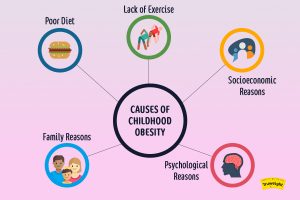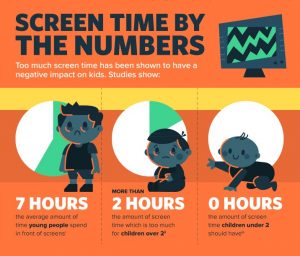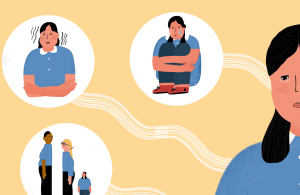Does Childhood Obesity affect School Performances?
“38 million children under the age of 5 were recorded as childhood obesity ”- WHO (2019)
Childhood obesity is no more appreciable in today’s time. Why? Because obesity at the age of 6-12 years impacts the overall children’s development. Moreover, it may induce further physiological and mental disorders in a child and poor academic performances (Yau, Castro, Tagani, Tsui, & Convit, 2012).
On the other side, we are aware of mobile phones’ benefits, but we rarely know about the disadvantages and the percentage of using smartphones is increasing among children.
The NPR organization (2019) report claims that 53% of 11 years old children have their personal smartphones. Also, children who spend almost four or five hours each day with a smartphone are more likely to be obese and have health risks.
Definition of Childhood Obesity?
According to WHO, “abnormal or excessive fat accumulation presents a health risk”. Thus, childhood obesity is one of the major global public health challenges of this century.
What is Childhood Obesity?
Childhood obesity is when a child gains unhealthy weight according to his/her age and height, although obesity is defined by body mass index or BMI.
It becomes a major problem when it leads to further physical health diseases. Also, it is evident that a poor lifestyle during childhood means continuous obesity in adulthood.
Moreover, obese children not only face physical health issues. Furthermore, children and teens who are overweight or obese can also become mental problems like depression and face poor self-image and self-esteem, towards society, in schools, or the family.
Prevalence of Childhood obesity:
Childhood obesity is a leading problem in almost every country. So, you can blame digitalization, mobile, and the internet for that.
Besides, In 2016, 41 million children were estimated as overweight at the age of five. Additionally, 13.7 million children approximately are obese at the age of 2-19 years.
Which country has the highest rate of childhood obesity?
Several studies are sharing multiple information; however, amongst them, these are the collated information:
China- 28 million
India- 14.4 million
United States of America- 13 million
Brazil- 5.2 million
Mexico- 5.1 million
Causes of Childhood Obesity

Genetics
It is one of the significant causes of childhood obesity. Thus, if your Family history or psychological factors, and lifestyle all play a role in childhood obesity.
Binge eating and less physical activity
The main childhood obesity cause is a lifestyle where the combination of overeating without exercising destroys your health.
Also, not doing enough physical activity can be another cause of childhood obesity and people of all ages tend to gain weight when they’re less active.
Less consumption of healthy foods
Moreover, A poor diet encompasses high levels of fat or sugar, and few nutrients can cause kids to gain weight fastly. Thus Fast food, candies, and soft drinks are common convicts.
And, the U.S. The Department of Health & Human Services (HHS) reports that 32 percent of teenage girls and 52 percent of adolescent boys in the United States drink 24 ounces of soda or more each and every day.
Psychological issues
Surprisingly, psychological problems like stress, anxiety, and depression may also lead to obesity in children because they eat junk food to cope with negative emotions. Therefore it can also cause child obesity.
Excessive use of Smartphone
Several studies suggested the positive relationship between the use of smartphones and the high risk of obesity.

Does Childhood Obesity Affect School performance?
Children with obesity are more likely to perform best at school. And, most of the children who were affected by obesity are bad at school (Taras, H & Potts-Datema, 2005).
Moreover, the question pop up in our head is why children with obesity are not good at school.
According to the report by Erickson H (2019) in “Childhood obesity often affects academic performance: now we may know why.” Apart from academic performances, an obese child deals with several social problems in school premises as they get bullied and ignored by peers. That’s why they find it hard to be at school, and they start avoiding going to school.
Thus, due to overweight in children, the level of cholesterol tends to increase, as a result of which children tend to be least active.
Therefore, it can also be the cause of bad performing at school because the more they are less active, the more things get more challenging for them. So, being less active or lazy, they can not learn things quickly at school, and they get worse at school performance.

Conclusion:
Children with obesity are a severe health problem where a child started gaining weight and ended up being overweight.
And when overweight comes, it does not come alone, it comes with different causes which impacts are harmful; so it is called childhood obesity.
Also, it almost happens when a child is less physically active or if he/she eats a lot of junk food. However, genetics can also be one of the causes of having obesity in a child if your family history or psychological factors, and lifestyle all play a role in childhood obesity.
Therefore, Having an overweight at this age where attending school is mandatory is difficult for these children because other children might bully them.
Bibliography
Childhood Obesity Facts | Overweight & Obesity | CDC. Cdc.gov. (2021). Retrieved 11 March 2021, from https://www.cdc.gov/obesity/data/childhood.html.
Erickson, H. (2019). Childhood obesity often affects academic performance: now we may know why. SIU News. Retrieved 11 March 2021, from https://news.siu.edu/2019/03/032619-research-studies-impact-of-obesity-on-academics.php.
If You Spend More Than These Many Hours A Day On Your Phone It Can Lead Obesity; Know Your Risks And Tips To Curb Smartphone Addiction. NDTV.com. (2019). Retrieved 11 March 2021, from https://www.ndtv.com/health/obesity-smartphone-use-can-lead-to-obesity-know-your-risks-and-tips-to-curb-smartphone-addiction-2076878.
India has the second highest number of obese children in the world. Downtoearth.org.in. (2017). Retrieved 11 March 2021, from https://www.downtoearth.org.in/news/health/india-has-the-second-higest-number-of-obese-children-in-the-world-58115#:~:text=China%2C%20with%2015.3%20million%20obese,million%20people%20in%20195%20countries.
Latest data shows southern European countries have highest rate of childhood obesity. Euro.who.int. (2018).https://www.euro.who.int/en/health-topics/disease-prevention/nutrition/news/news/2018/5/latest-data-shows-southern-european-countries-have-highest-rate-of-childhood-obesity.
Noncommunicable diseases: Childhood overweight and obesity. Who.int. (2020). https://www.who.int/news-room/q-a-detail/noncommunicable-diseases-childhood-overweight-and-obesity.
NPR Cookie Consent and Choices. Npr.org. (2019). Retrieved 11 March 2021, from https://www.npr.org/2019/10/31/774838891/its-a-smartphone-life-more-than-half-of-u-s-children-now-have-one#:~:text=Just%20over%20half%20of%20children,lot%20of%20decoding%20to%20understand.
Taras, H., & Potts-Datema, W. (2005). Obesity and Student Performance at School. Journal Of School Health, 75(8), 291-295. https://doi.org/10.1111/j.1746-1561.2005.00040.x
Wang, Y., & Lim, H. (2012). The global childhood obesity epidemic and the association between socio-economic status and childhood obesity. International Review Of Psychiatry, 24(3), 176-188. https://doi.org/10.3109/09540261.2012.688195
Yau, P., Castro, M., Tagani, A., Tsui, W., & Convit, A. (2012). Obesity and Metabolic Syndrome and Functional and Structural Brain Impairments in Adolescence. PEDIATRICS, 130(4), e856-e864. https://doi.org/10.1542/peds.2012-0324
https://www.ndtv.com/topic/doctorndtv
https://worldmapper.org/maps/obese-children-2015/
https://edition.cnn.com/2019/02/13/health/child-obesity-parenting-without-borders-intl/index.html
https://www.who.int/news-room/facts-in-pictures/detail/6-facts-on-obesity.
https://www.healthline.com/health/weight-loss/weight-problems-in-children#causes.
https://aspe.hhs.gov/basic-report/aspe-childhood-obesity-white-paper
https://www.webmd.com/children/guide/obesity-children.
